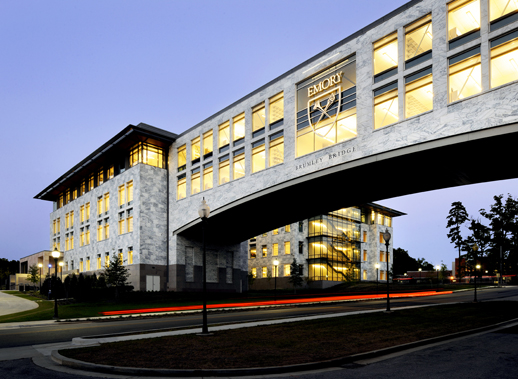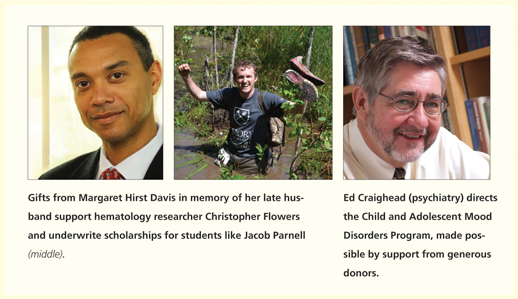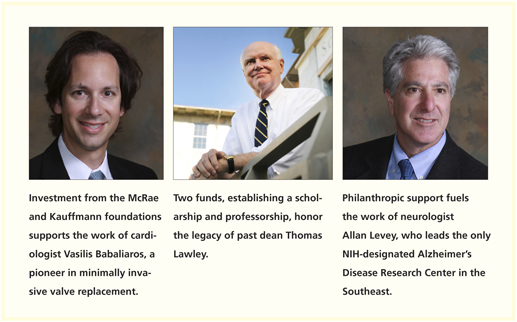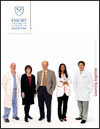Investing for today and tomorrow

A two-story bridge, named for the late Emory pediatrics chair George Brumley, connects Emory’s new Health Sciences Research Building with Emory’s outpatient pediatric facility. The new building houses researchers in drug discovery, gastroenterology, transplant immunology, nephrology, biomedical engineering, genetics, informatics, outcomes research, public health, and clinical research.
|
In this report CLINICAL CARE EDUCATION |
The medical school has a dedicated and growing cadre of friends whose support helps patients, young people who aspire to a career in serving patients, and researchers seeking better ways to treat and prevent disease and suffering.
Helping kids and families
The Marcus Foundation has given great hope to kids and their families in Georgia and beyond by giving more than $12 million to Emory’s Department of Pediatrics. The funds created the Marcus Society, a partnership of faculty experts who specialize in cystic fibrosis, infectious diseases, juvenile arthritis, heart disease, and many other areas. The Marcus Society also hosts an annual visiting scholar. The Marcus professorships represent the greatest concentration of these distinguished academic positions funded by a single donor in any one area at Emory. The Marcus Foundation also supported creation of JScreen (www.jscreen.org), a nonprofit initiative managed by Emory’s Human Genetics Department, to screen couples for 19 genetic diseases that are more common in the Jewish-Ashkenazi community. JScreen also offers an extended panel, useful for mixed-descent and interfaith couples, to screen for a total of 80 diseases. In addition to testing, the program offers patient education and genetic counseling.

Advancing research and rural medicine
Moved by her grandson’s struggle with Burkitt’s lymphoma, Margaret Hirst Davis created a research fund at Emory’s medical school and a scholarship for medical students. Both gifts are endowments.
The Byron Davis Research Fund supports two Emory faculty members in hematology and oncology, Leon Bernal-Mizrachi and Christopher Flowers. Their research is creating technologies that match each patient’s unique cancer growth signals with specific therapies that can block these signals.
The endowed scholarship memorializes Davis’s husband, Byron Scott Davis 49M 50MR, and gives students, particularly those interested in pursuing a career in rural health care, a chance to attend the medical school. One of those students is Jacob Parnell 16M.
Hope for youth
Mary and John Brock and their three children continue to support the Child and Adolescent Mood Disorders Program (CAMP), a program the Brocks helped establish. Directed by Edward Craighead, J Rex Fuqua Chair of Psychiatry and Psychology, CAMP facilitates the development of innovative, effective clinical programs for child and adolescent depression, anxiety, and bipolar disorders. The Brock fund allows treatment of uninsured patients who are unable to afford clinical services for their children. Generous support from the Fuqua family also helps support CAMP and established the named chair for Craighead.

The pulse of progress
Groundbreaking cardiology work at Emory is restoring health and hope for heart patients and making a difference in the Southeast and the world. Philanthropic investments, including recent commitments and gifts from the Selby and Richard D. McRae Foundation of Mississippi and the Kauffmann Family Foundation, headquartered in Georgia, are helping advance heart care at Emory. A multidisciplinary team led by interventional cardiologist Vasilis Babaliaros and cardiothoracic surgeon Vinod Thourani performs pioneering, minimally invasive procedures to treat heart disease. They performed the nation’s first SAPIEN transaortic valve replacement and North America’s first transcatheter aortic valve replacement.
Honoring a leader with largesse
With the same generosity of spirit that characterized Thomas Lawley’s 16-year tenure as dean of Emory’s School of Medicine, people inside and outside the school are giving to two initiatives to honor his service and accomplishments. The Thomas J. Lawley, MD Scholarship will represent in perpetuity Lawley’s lifelong commitment to medical education, and the Thomas J. Lawley, MD Professorship in Dermatology.
When Lawley, who is William P. Timmie Professor, stepped down from his post in September 2012, he had overseen the matriculation of 7,066 medical students.
Momentum in Alzheimer’s research
As many as 5.1 million Americans have Alzheimer’s disease. Emory’s NIH-designated Alzheimer’s Disease Research Center (ADRC) is the only NIH-designated ADRC in the Southeast, signifying the highest status an institution can receive in Alzheimer’s research and care. It is a magnet for patients, a vital source of training and education for the community and for other professionals, and a catalyst for research, including research to develop new biomarkers and treatments. Allan Levey, Betty Gage Holland Chair in Neurology, directs the ADRC and chairs the Department of Neurology. The momentum of his and his colleagues’ research is stronger than ever and provides hope to an aging population. Their work is fueled by philanthropic support, including that of the Jim Cox, Jr. Foundation, Sarah and Jim Kennedy, Mary Rose Taylor, and Harriet and Charlie Shaffer.
For information about how you can support any of these programs or others at Emory, contact:
Vice President, Development
Robert W. Woodruff Health Sciences Center
Emory University
1440 Clifton Road NE, Suite 170
Atlanta, GA 30322
mbmckay@emory.edu
Office: 404.727.3518

